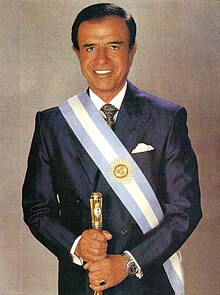Carlos Menem
Carlos Saúl Menem tí wọ́n bí ní ọjọ́ kejì oṣù keje ọdún 1930, tí ó ṣaláìsí ní ọjọ́ kẹrìnlá oṣù kejì ọdún 2021, jẹ́ agbẹjọ́rò àti olóṣèlú tí ó jẹ́ Ààrẹ orílẹ̀-èdè Argentina láàrín ọdún 1989 sí ọdún1999. Òun ni wọ́n gbà wípé ó jẹ́ bàbá ìsàlẹ̀ fún Peronist ní orílẹ̀-èdè Agentina àti alátìlẹyìn economically liberal. Ó dari orílẹ̀-èdè Argentina gẹ́gẹ́ bí Ààrẹ ní àárín ọdún 1990, ó sì ṣe agbékalẹ̀ free market liberalization lásìkò tirẹ̀. Ó ṣe Ààrẹ fún ọdún mẹ́tàlá gbáko lábẹ́ abùradà ẹgbẹ́ ìṣèlú Justicialist Party láti ọdún 1990 sí 2001 àti 2001 sí 2003, ìlànà ìṣèlú ni wọ́n pè ní Federal Peronism.[1]
Carlos Menem | |
|---|---|
 Official presidential portrait, 1995 | |
| President of Argentina | |
| In office 8 July 1989 – 10 December 1999 | |
| Vice President |
|
| Asíwájú | Raúl Alfonsín |
| Arọ́pò | Fernando de la Rúa |
| National Senator | |
| In office 10 December 2005 – 14 February 2021 | |
| Asíwájú | Eduardo Menem |
| Constituency | La Rioja |
| President of the Justicialist Party | |
| In office 28 November 2001 – 11 June 2003 | |
| Asíwájú | Rubén Marín |
| Arọ́pò | Eduardo Fellner |
| In office 10 August 1990 – 13 June 2001 | |
| Asíwájú | Antonio Cafiero |
| Arọ́pò | Rubén Marín |
| Governor of La Rioja | |
| In office 10 December 1983 – 8 July 1989 | |
| Vice Governor | Alberto Gregorio Cavero |
| Asíwájú | Guillermo Jorge Piastrellini (de facto) |
| Arọ́pò | Alberto Gregorio Cavero |
| In office 25 May 1973 – 24 March 1976 | |
| Vice Governor | Libardo Sánchez |
| Asíwájú | Julio Raúl Luchesi (de facto) |
| Arọ́pò | Osvaldo Héctor Pérez Battaglia (de facto) |
| Àwọn àlàyé onítòhún | |
| Ọjọ́ìbí | Carlos Saúl Menem 2 Oṣù Keje 1930 Anillaco, La Rioja, Argentina |
| Aláìsí | 14 February 2021 (ọmọ ọdún 90) Buenos Aires, Argentina |
| Resting place | San Justo Islamic Cemetery |
| Ẹgbẹ́ olóṣèlú | Justicialist Party |
| Other political affiliations |
|
| (Àwọn) olólùfẹ́ |
|
| Àwọn ọmọ | 4, including Zulemita |
| Relatives | Eduardo Menem (brother) |
| Signature |  |
Wọ́n bi ní ìlú Anillaco sínú ẹbí ọmọ orílẹ̀-èdè Syrian. Wọ́n tó Me be ní ìlànà ẹ̀sìn Mùsùlùmí ,[2] àmó ó padà gba ẹ̀sìn kìrìstẹ́nì lábẹ́ ìjọ Aguda ti Roman Catholicism látàrí kí ó lè kópa nínú ìṣèlú.[lower-alpha 1] Menem became a Peronist during a visit to Buenos Aires. He led the party in his home province of La Rioja and was elected governor in 1973. He was deposed and detained during the 1976 Argentine coup d'état and was elected governor again in 1983. He defeated the Buenos Aires governor Antonio Cafiero in the primary elections for the 1989 presidential elections. Hyperinflation and riots forced outgoing president Raúl Alfonsín to resign early, shortening the presidential transition.
Menem supported the Washington Consensus and tackled inflation with the Convertibility plan in 1991. The plan was complemented by a series of privatizations and was initially a success. Argentina re-established diplomatic relations with the United Kingdom, suspended since the 1982 Falklands War, and developed special relations with the United States. The country suffered two terrorist attacks. The Peronist victory in the 1993 midterm elections allowed him to persuade Alfonsín (by then leader of the opposition party UCR) to sign the Pact of Olivos for the 1994 amendment of the Argentine Constitution. This amendment allowed Menem to run for re-election in 1995, which he won. A new economic crisis began, and the opposing parties formed a political coalition winning the 1997 midterm elections and the 1999 presidential election.[1]
He was investigated on various criminal and corruption charges, including illegal arms trafficking (he was sentenced to seven years in prison), embezzlement of public funds (he was sentenced four and half years to prison), extortion and bribery (in both of which he was declared innocent). His position as senator earned him immunity from incarceration.[3][4]
Menem ran for the presidency again in 2003, but faced with a likely defeat in a ballotage against Néstor Kirchner, he chose to pull out, effectively handing the presidency to Kirchner. He was elected senator for La Rioja in 2005. By the time of his death in 2021 at age 90, he was the oldest living former Argentine president.[lower-alpha 2] He is regarded as a polarizing figure in Argentina, mostly due to corruption and economic mismanagement throughout his Presidency

|
Àyọkà yìí tàbí apá rẹ̀ únfẹ́ àtúnṣe sí. Ẹ le fẹ̀ jù báyìí lọ tàbí kí ẹ ṣàtúnṣe rẹ̀ lọ́nà tí yíò mu kúnrẹ́rẹ́. Ẹ ran Wikipedia lọ́wọ́ láti fẹ̀ẹ́ jù báyìí lọ. |
Itokasi
àtúnṣe- ↑ 1.0 1.1 "Carlos Menem, Argentine President Who Ushered in 'Pizza and Champagne' Era, Dies at 90". The Wall Street Journal. Retrieved 14 February 2021.
- ↑ "Carlos Menem" Encyclopædia Britannica
- ↑ "Argentina: Ex-president gets 7 years in prison for arms smuggling". CNN. 13 June 2013.
- ↑ "Americas | Menem probed over 1995 explosion". BBC News. 16 August 2008. http://news.bbc.co.uk/2/hi/americas/7564660.stm.
Àṣìṣe ìtọ́kasí: <ref> tags exist for a group named "lower-alpha", but no corresponding <references group="lower-alpha"/> tag was found